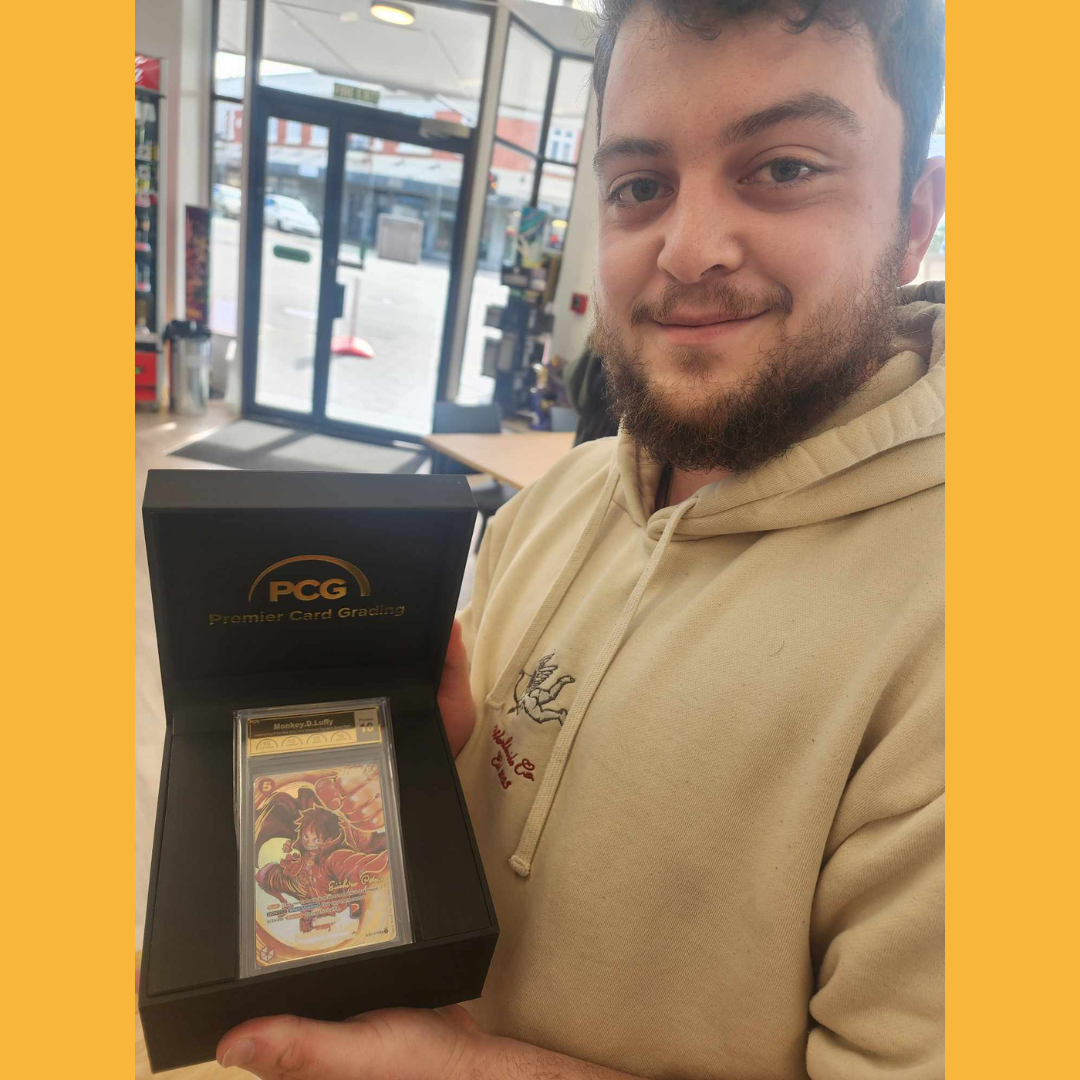Slivers Are Back?!? Edge of Eternities Spoilers Ahead!
Slivers Are Back, Back Again.

What is Grading? Wilson explores in the ins and outs of grading your treasured cards!
What is Grading?
Grading is the process by which any card, be it for a TCG or memorabilia is authenticated and professionally examined to determine the condition or the “grade” of the card before it is then sealed with a label in a plastic slab for safe keeping. For the purposes of this article I will only be focusing on the card side of grading, but it is so much broader than just cards. Most grading companies will authenticate autographs, grade comic books, sports/concert tickets and more! If it is collectable, it most likely can be graded, but remember that not all companies grade as many varieties.
How are cards graded?
Cards will be assessed on four metrics:
Each of these 4 aspects will be assessed on a 10 point scale with 1 being the lowest and 10 being the highest. These will then be collated to give you an overall grade on the same scale as you can see here:
It is important to note however that some companies will grade in steps of .5 like Beckett and PCG, while others grade in steps of 1, which can affect the overall grade your card receives at the end.
Why Grade?
I perceive that there are 2 main reasons why people grade their cards: sentiment and value.
Sentiment
One of the key benefits of grading any card is the hard protective case that the card gets encased in. This case is tough and durable and easily protected in a graded card sleeve for extra protection to ensure the long term protection of your precious cards either from your childhood or your biggest pull that a sleeve, toploader or binder can ever provide. While magnetic cases do also provide good protection, graded slabs require a great deal of force to break into. Enough force that could put the card at risk.
Value
For the more savvy collector, a graded card exponentially increases the value of a card as opposed to the raw card value. Of course, this is a bit of a lottery as you can never be entirely sure of the grade your card is going to receive. High grades from reputable companies can almost double the value of your card. However this is not absolute. While the value of cards is arbitrary in the first place, graded cards rely more heavily on market last sold prices to determine the value of the card. But if you have the right piece and perhaps a bit of patience, then you could see massive returns in the long run.
Where to grade?
There are many different companies that you can grade with, and many more that spring up year to year, so it is important to know some of the pros and cons of the main companies, especially as the value of graded cards is directly related to who graded the card.
PSA
The Professional Sports Authenticator is arguably the most recognisable and most well known grading company. Based in the United States, this company is one of the safest choices when it comes to grading. As aforementioned, some companies used a 1 point scale when it comes to grading, so with PSA you can either get a 10 or a 9 depending on the sub grades of the card. PSA does not offer these subgrades to you on the card so you won’t be able to tell where your card falls short. However, PSA offers in my opinion one the best record keeping when it comes to grading population reports, pricing values, and just overall collections. PSA also offers a strong certification and security features to ensure you are getting a legitimate card. Because PSA is overseas, sending your cards can be a little more difficult and pricey especially if you want insurance but they are the go to when it comes to grading so if you’re willing to take the risk and the price then this is a great choice.
Beckett
Beckett is the other well recognised grading company along with PSA. However, Beckett are a little tougher when it comes to their grading and because of this they have developed an almost luxury appeal to their higher grades. If you have higher end cards when it comes to raw value, especially sports cards then Beckett is your go to. Part of what contributes to Beckett’s elite appeal is the fact that they use a .5 grading scale as opposed to the 1 point grading scale. This gives the company more leeway when it comes to handing out higher grades and means that if something scores high with Beckett, then it more likely is the best of the best. The highest point being the Beckett “Black label”. Some companies will offer a different colour label that corresponds to the overall grade the card receives. In the case of Beckett, the black label is reserved only for cards that receive a perfect 10 in all 4 categories and the “Pristine” grade. With this grade, a card can expect at a minimum to double the raw value of the card. Beckett is slightly more expensive to send to but for those higher end cards, definitely worth it. However due to the independent nature of each grading company, a 10 at one company may not equate to that at another. So if you're wanting a high grade on a card but are unsure about any potential defects, it may be a safer bet to send to another company.
PCG
For those of you who, like me, are based in New Zealand, fear not, we have a local company that has recently entered the field and is growing rapidly! Premier Card Grading is based in Auckland and aims to be another player in the high end grading field. Offering affordable prices and easy insurance on your cards, PCG provides a very efficient service and nice metal labels for their slabs that provides an excellent experience. Similar to Beckett, they operate on a .5 point scale, and offer varying label colours depending on the overall grade of the card, with their highest grade being a gold label for the quad 10 pristine grades. Having graded most of my cards with PCG, I can speak to the quality of their slabs and also their customer support. The one thing about PCG is the fact that they are a newer company and are not as recognised on the global scale, PCG grades do not yet offer as much value especially for the higher end stuff. However, because of their quality work, using PCG can be a great way to get an indication on what your card might receive. PCG also offers a variety of slab types depending on the TCG, especially for people who might still want options that allow continued play of a graded card.
There are many more companies offering a variety of services and each with their own pros, cons, and reputations, so the important thing is to do your own research when deciding who you want to submit to.
Submitting your cards
When it comes to actually submitting your cards, depending on which company you send to, they may have specific instructions on how they want you to prepare your cards, so it is important you follow those first and foremost. However this will provide you with a good template if they do not.
First, make sure your card is clean and tidy. If needed, a microfibre cloth can be used to wipe down the card. However, do not take any significant steps to alter your card to potentially improve the card as this can potentially damage the card and prevent a legitimate grade.
Second, place the card in an appropriately sized penny sleeve. This is to ensure the card has a simple layer of protection. Do not use a perfect sleeve or a tighter fit sleeve as this can prevent the grading company from successfully removing the card.
Third, place the card in a top loader appropriately sized for your card. Especially with higher end cards, it can be useful to gently tape a firm strip of paper to the penny sleeve prior to inserting the card and before placing it all into the top loader.
Fourth wrap the toplader in firm cardboard and then potentially bubble wrap. This step is one that will change easily between companies and their preference but make sure you do it to a step where you feel comfortable sending your card.
Fifth, some companies will either have you write the order number on the packaging or insert an order form in with the package prior to putting it into its final postal packaging like a firm box or container before sending it away and ensuring protection against all elements.
Once again, make sure to do your research on how best to prepare your card and follow any and all instructions your grading company sends you.
In the end, grading is a unique and fun experience and a great way to protect the best bits of your collection and is something that any card collector should do at some stage in their collecting lifetime.
Wilson Ludlow
Hobby Lords Dunedin
Slivers Are Back, Back Again.
But what can you get from participating?
